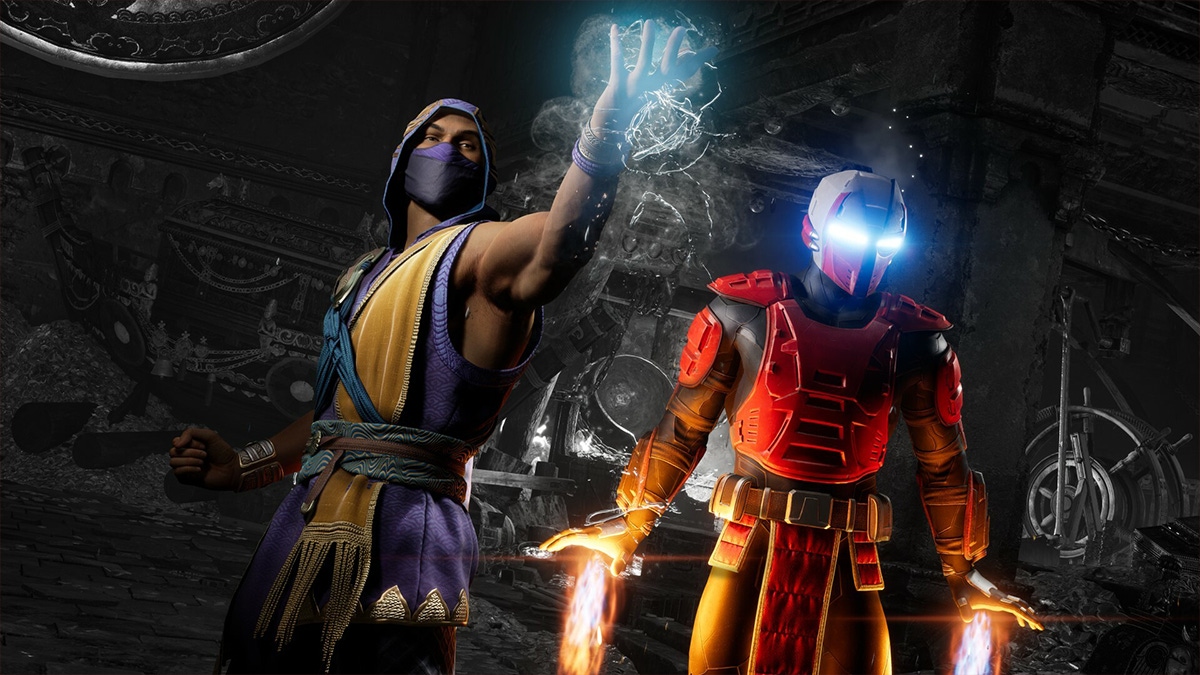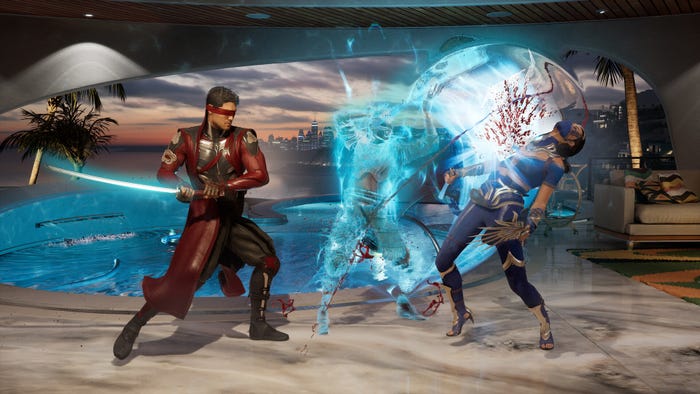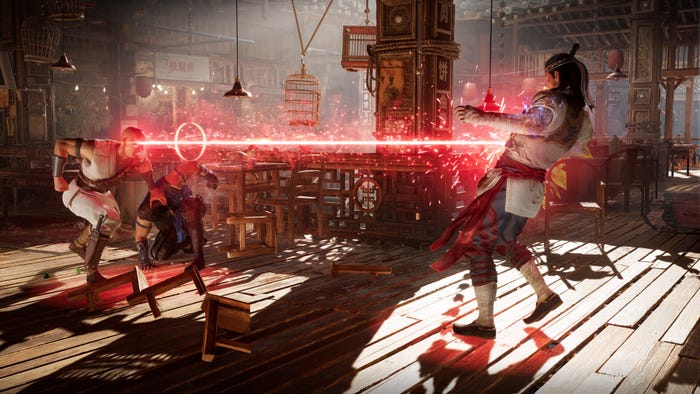Trending
Opinion: How will Project 2025 impact game developers?
The Heritage Foundation's manifesto for the possible next administration could do great harm to many, including large portions of the game development community.
Veteran composer Wilbert Roget explains why he ditched superhero bombast in pursuit of something more personal in NetherRealm's bloody fighter.

Wilbert Roget isn't slowing down. The veteran composer, known for working on major releases like Call of Duty: WWII, Destiny 2: Forsaken, and Vader Immortal, has just been nominated for an 2024 ASCAP Composers' Choice Award for their monumental Mortal Kombat 1 score.
It's the latest in a growing pile of nominations and awards for the soundsmith, and it might not be the last nod he receives in 2024. Roget has also worked on two of this year's best and brightest in Helldivers 2 (we suspect you've heard of that one) and Pacific Drive. You'll also hear his musical stylings in Ubisoft's upcoming open-world adventure Star Wars Outlaws.
Focusing on the here now, however, Mortal Kombat 1 represents something of a return journey for Roget. Having previously composed the main theme and story mode tracks on Mortal Kombat 11, Roget was brought back into the franchise fold by developer NetherRealm to imbue its sequel-slash-reboot Mortal Kombat 1 with a new sonic identity. That required Roget to pen entirely new themes for the titie's factions and characters at the request of chief creative officer, Ed Boon, who felt Mortal Kombat 1 should represent something of a clean break within a "reborn universe."
During a Q&A with Game Developer, Roget explained he rose to that challenge by placing a "greater focus" on world instruments and vocals to contrast the bombastic orchestration present in the previous game. He said the approach allowed for more moments of "peace and tranquility"–veering away from the "superhero" tendancies of Mortal Kombat 11–to create something distinct while still adopting an "identical approach to harmony and leitmotif."
To learn how Roget helped craft Mortal Kombat 1's more personal, nuanced sound, we asked him to break down his process in painstaking detail, and fortunately for us, he obliged.
Game Developer: Could you outline some of the challenges and considerations unique to scoring a fighting title?
Wilbert Roget: Fighting games tend to have many more characters than a typical game, and we must consider the hardcore fans that have devoted countless hours into mastering one or two individual characters. As a result, it can be particularly difficult to organize a score for a fighting game's story mode. My solution was to take a Wagnerian approach to the Mortal Kombat 1 score (similar to the previous game), using leitmotifs and signature sounds for each character and faction.
Mortal Kombat specifically has a few additional intricacies–first off, our stages need to function both in selling the dark, gruesome setting as well as being hype and energetic for the gameplay. We accomplish this by using various non-orchestral genres (like EDM and metal) for the stages but coloring these pieces with Mortal Kombat's particular approach to harmony, and references to my themes as well. And lastly, our Story modes must seamlessly connect prerendered cinematics with real-time gameplay, which we achieved by carefully planning when each cinematic cue begins and ends, bringing in gameplay music via multitracked and beat-synchronized stage intros.

Image via NetherRealm
It's been four years since the launch of Mortal Kombat 11, so I'm curious to know if you applied lessons learned on that project to Mortal Kombat 1?
Although the first track I wrote for Mortal Kombat 11 was in fact my demo piece, the main theme 'A Matter Of Time,' it took me a little while to develop the cinematic style I'd use for the rest of the score. So relatively speaking, I was able to hit the ground running on Mortal Kombat 1, with a good sense of the vibe I would need to create, and better instincts when designing new signature sounds.
On a technical level, having worked on Helldivers 2, Pacific Drive, and Gundam: Requiem for Vengeance in between the two Mortal Kombat scores gave me much more experience working with synths and musical sound design especially. And just as importantly, I had already built up a roster of incredible musicians and collaborators from these previous scores that I would eventually call upon to collaborate once again.
I read an interview where you explained your Mortal Kombat 11 score was entirely character-based. How did you weave in leitmotifs and perhaps add new flourishes this time around as the action moved into a new timeline?
The Mortal Kombat 1 Story mode has fewer main featured characters than Mortal Kombat 11, and I could frequently group some characters into a single faction (e.g. Smoke, Sub-Zero, and Scorpion all share the Lin Kuei leitmotif), so there was less a focus on individual characters and more on the greater themes of the story itself. I also created a "tournament" leitmotif that eventually became the theme for all our protagonists as a unit, as well as an Outworld theme that represented not only Kitana and Mileena but also the state of Outworld society and customs. And just as Mortal Kombat 11's Special Forces leitmotif was eventually promoted to be a theme for family, the emotional driving force of that game, my leitmotif for Johnny Cage gradually became a conceptual theme for friendship in Mortal Kombat 1.
Of course, the ending of Mortal Kombat 1 involves the clash of many different timelines, and so I used that as an opportunity to finally bring back some themes from Mortal Kombat 11 in all their epic, super heroic splendor.
Getting technical, could you outline some scoring practices you feel are absolutely fundamental to imbuing the distinct characters and stages of MK1 with a sense of identity and authenticity?
As the original composer of the franchise, Dan Forden, Audio Director at NetherRealm Studios, had already established a unique sound for Mortal Kombat that we sometimes refer to as “savage intelligence” – aggressive percussion and rhythms juxtaposed against sophisticated harmony and orchestration, with dark octatonic and charomatic tones throughout. When I first started scoring Mortal Kombat 11, I established one harmony in particular–the <016> octatonic-based triad–as both the harmonic and melodic center of the score. This triad formed the basis of what I called the "Kombat Theme," a leitmotif used to describe how the game's world seemingly resolves all altercations with violence and gore.
As far as authenticity, I also made sure to incorporate world instruments into the score, with expert live performers from China, Japan, and Greece playing a variety of instruments to illustrate the game's characters and locales. In addition to giving players notated parts, I often asked them to improvise over sections of the pieces; I could then take these even more authentic performances and edit them into other pieces, or even augment the notated parts.
Lastly, my final boss themes for Mortal Kombat 1 were each written as references to other eras in the franchise. On the OST release, the "Pyramid" track begins with a four-on-the-floor techno beat with syncopated orchestra hits reminiscent of the original Mortal Kombat film and games. Later in the track, the beat changes to a more modern trap/EDM sound that represents the modern hip-hop influences of the franchise's current era; this beat was co-produced by A_Rival, the producer of our ending credits song "Second Chance." And then in the track "Pyramid Summit," I used metal drums and guitar, again as a reference to the music from the original Mortal Kombat film.
Scoring with such a diverse roster of fighters in mind must have given you the chance to experiment. What were some of the most unorthodox instruments and tools you brought into the MK1 soundscape, and how did you blend them with the rest of the score?
One new aspect to Mortal Kombat 1 is the inclusion of a few diegetic cues – in other words, music that exists within the world and can be heard by the characters. So for example, a quartet of Chinese traditional instruments plays in the first cutscene of Madame Bo's restaurant, with guzheng, pipa, erhu, and dizi playing an arrangement of the Fengjian theme I use for Raiden and Liu Kang. Later, during a banquet in Outworld, a vocalist sings a tribute to the late King Jarrod that I wrote in Greek, with oud accompaniment and references to Jarrod's and Sindel's themes.
In addition to real instruments, I also perform a few "improvised" instruments throughout the score. For instance, Baraka's theme uses a scratchy string ensemble sound I created by multitracking myself playing his melody on acoustic guitars and mandolins with a violin bow. Ashrah's theme uses a similar bowed mandolin technique, but this time detuned down an octave and played through a guitar amp. And for Reptile, I use a sound derived from our woodwind soloist Kristin Naigus playing a bass clarinet with a unique animalistic growling technique that underscores his lizard-like identity.

Image via NetherRealm
How did you work with the NetherRealm team to create and balance the score for each of Mortal Kombat 1's stages, packing enough oomph to build atmosphere without drowning out the action unfolding onscreen?
I only composed the main themes, cinematic Story mode, and ending boss stages myself–most of the stages were scored by Dan Negovan, Dan Forden (Audio Director, NetherRealm Studios), Casey Edwards, Nathan Grigg (Principal Composer, Warner Bros. Games), and Stephanie Economou. At the start of the project, Rich Carle, NetherRealm Studios Director of Audio, sent the other composers my main theme and some notated scores outlining each of the principal themes I'd written. Rich then supervised all the composers as they wrote these stage suites, incorporating my themes where appropriate.
We have much more stylistic diversity in this score than we did back on Mortal Kombat 11, with tracks incorporating EDM, metal, and traditional Chinese instrumentation, so having these themes as well as our characteristic harmonic language helped unify the score. We also have a beat-synchronized interactive music system, with unique cues for intros, transitions, fight loops, "Finish Him!" loops, and endings for each round to seamlessly underscore the contour of gameplay.
Mortal Kombat is a franchise known for its unapologetic brutality, but how did you address the need for a certain amount of aggression without sacrificing subtlety?
One of the biggest surprises I had when scoring Mortal Kombat 11 was just how emotionally varied the cutscenes were. The franchise has a reputation for brutality, but the story runs a full gamut of human experiences, from romance to comedy to loss and tragedy, just like a blockbuster Hollywood film.
Whenever I encountered romantic scenes like Kotal Kahn reuniting with Jade in Mortal Kombat 11, or even comedic moments like Johnny Cage's antics in Mortal Kombat 1, our NetherRealm Studios Cinematic Development Director Marty Stoltz would always encourage me to go all out with the emotional side and not be too tied-down to the stereotypes of the franchise. I think that's part of my job as the composer–not just to underscore the scene, but to help expand the expectations of what Mortal Kombat can be as a story. So, I'm very grateful for the opportunity to contribute to the franchise yet again!
You May Also Like